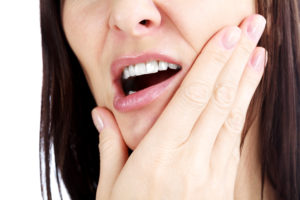Most people have experienced a popping or clicking jaw at least once, or at least know someone who has. Because it happens so frequently, not everyone realizes that clicking jaw joints could be a sign of a serious disorder (known as TMJ disorder). If left untreated, the symptoms can grow to include severe discomfort, chronic headaches, difficult jaw movement, and more.
Even if you don’t understand it, the presence of TMJ disorder can be troublesome due to its many symptoms. If you experience them, or if your dentist discovers that your jaw joints are damaged, inflamed, or out of alignment, then personalized TMJ treatment can help restore harmony to your bite.
TMJs and Jaw Function
TMJ stands for temporomandibular joint, and your jawbone relies on two of them (one on each side) to open, close, and move around as you bite, chew, and speak. Each joint is located just in front of each ear, and in close proximity to the trigeminal nerve group that controls your jaw’s movement. Together, TMJs, jaw muscles, and the trigeminal nerves account for your jaw’s and bite’s ability to function.
TMJ Disorder Symptoms and Treatment
TMJ disorder, or TMD, occurs when one or both of your TMJs become damaged, inflamed, forced out of alignment, or suffers degradation from arthritis. The damage can cause the joints to not function properly, and to disturb your trigeminal nerves, leading to a host of painful systems, including;
- Popping sensations in your jaw’s joints
- Stiffness and soreness in your jaw and facial muscles
- Occasional locked-jaw
- Chronic, severe headaches and migraines
- Frequent pain and ringing in your ears
- And more


